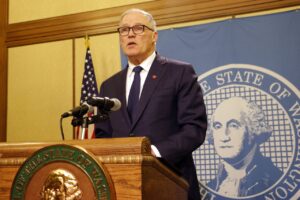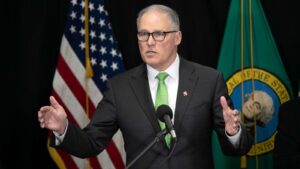UW professors debate constitutionality of Washington’s capital gains tax
4 min read
What’s in a name? A lot, according to two University of Washington (UW) professors who recently debated the state’s nascent capital gains tax. That’s because the tax’s constitutionality hinges on whether it’s characterized as an income tax or an excise tax.
At issue is the statewide capital gain tax approved by the Legislature and signed by Gov. Jay Inslee in 2021. The legislation placed a 7% tax on the sale of stocks, bonds, and other assets above $250,000. The Washington State Constitution’s uniformity clause does not allow income to be taxed at different rates.
On March 1, Douglas County Superior Court Judge Brian Huber ruled the tax unconstitutional, siding with plaintiffs in supporting their definition of capital gains as income. State Attorney General Bob Ferguson has since asked the state Supreme Court to take up the case on direct appeal.
Should the case end up before the state’s highest court, UW constitutional law professor Hugh Spitzer thinks “it is more likely than not” that the justices will side with the state.
“As an excise tax it’s again likely that the state Supreme Court would rule that it’s constitutional,” he said during Thursday’s debate on TVW.
Spitzer explained how the state’s definition of an excise tax skirts existing court precedent that defines income as property that can’t be taxed at a graduated rate per the state constitution.
“Under Washington law, an excise tax is a tax on activity, on an event,” he said. “Property tax a tax on standing property.”
That means when property is sold, money from that sale is taxed based on a separate decades-old state Supreme Court ruling.
In 1952, the high court ruled in Mahler v. Tremper that a county tax on the sale of real estate is an excise tax and not a property tax because it is a tax on the transaction rather than merely ownership.
“And that’s how the capital gains tax was structured from a state law perspective,” Spizter said. “It’s a tax on the activity of selling certain kinds of capital assets measured by the amount of the gain.”
UW tax law professor Scott Schumacher contends the capital gains tax operates so much like an income tax that it is essentially just that.
“I think it is an income tax the way it’s measured, how it’s reported,” he said. “The various deductions and exemptions make it seem more like an income tax than an excise tax. I mean the Legislature called it an excise tax, but I think the indicia of the tax make it more like an income tax, and as such there is 70 years, 80 years, worth of Washington Supreme Court decisions on this saying that an income tax or a tax on property is unconstitutional.”
Schumacher also pointed out the capital gains tax, in his view, runs afoul of the state constitution’s requirement that any tax on property be imposed in a uniform manner.
“It’s only applied to those that that have capital gains above $250,000,” he said.
Schumacher summed up his overall position by noting capital gains tax supporters’ contention that it’s an excise tax doesn’t necessarily make it so.
“I think just because they can say it’s an excise tax doesn’t mean that it is,” he said.
It’s widely expected the state Supreme Court will have final say on the matter, although the court has yet to make a decision as to whether it will hear the case right away, or return it back to an appeals court first.
Spitzer thinks the state Supreme Court will hear the case sooner rather than later.
“My hunch is that they will because it just saves everybody a lot of time and trouble,” he said.
Spitzer predicted the high court will take the middle ground in overturning the Douglas County Superior Court’s decision by characterizing the capital gain tax a “run-of-the-mill excise tax,” but won’t reverse the state Supreme Court’s 1933 decision in Culliton v. Chase in which the justices invalidated a voter-approved progressive income tax meant to pay for education.
Schumacher disagreed.
“I think the court will take the broader view and will follow its precedent of Culliton – and it’s not just that one but other case over the years, over the decades – and hold that this is a tax on property and is unconstitutional,” he said. “And then leave it up to the voters.”
Opponents of the capital gains tax are already attempting to gather enough signatures to get Initiative 1929, which would repeal the tax, on the November 2022 ballot.
This article was originally posted on UW professors debate constitutionality of Washington’s capital gains tax






